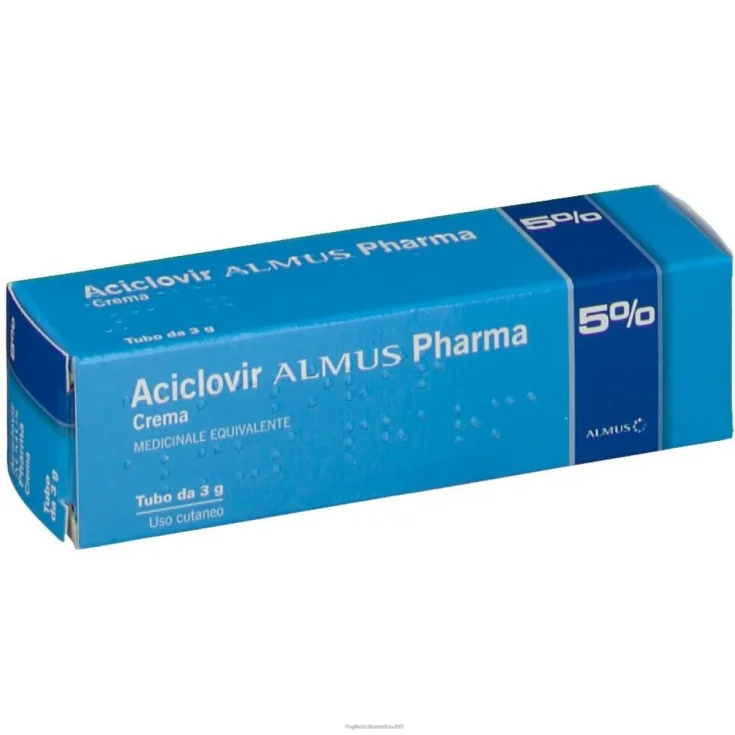Almus Aciclovir 5% Cream For Herpes Labial 3g
9,60€
o paga in 3 rate senza interessi
da 3,20€

o paga in 4 rate senza interessi
da 2,40€


- Brand: ALMUS Srl
- Product Code: 040607018
- EAN:
- Availability: In Stock (evaso in 24 ore)
FAST Verifica disponibilità FAST
- 3 items
for 9,41€ each - 4 items
for 9,22€ each - 5 items
for 9,02€ each
Almus
Aciclovir 5% Cream
For Cold Herpes
Treatment of herpes simplex virus infections of the lips (recurrent herpes labialis) in adults and adolescents (over 12 years of age).
Active principles
1g of cream contains 50mg of acyclovir.
Excipients
Tefose 1500, glycerin, stearic acid, liquid paraffin, methyl-para-hydroxybenzoate, purified water.
Contraindications / Side Effects
Patients with known hypersensitivity to aciclovir, valaciclovir or to any of the excipients. Children under the age of 12.
Dosage
Adults and adolescents (age> 12 years). Apply 5 times a day at intervals of about 4 hours, omitting the night application. Apply to lesions or areas where they are developing as soon as possible after the onset of infection. It is particularly important to start treatment for recurrent episodes during the prodrome phase or at the first appearance of lesions. The treatment must continue for at least 5 days and up to a maximum of 10 if there is no healing. Patients should wash their hands before and after applying the cream and avoid unnecessarily rubbing the lesions or touching them with a towel in order to avoid worsening or transmission of the infection. Children aged <12 years. The safety and efficacy have not been studied in patients younger than 12 years.
storage
Store at a temperature not exceeding 25 degrees C. Do not refrigerate.
Warnings
Use only for cold sores present on the lips. The drug is not for ophthalmic use, nor is it recommended to apply it to the mucous membranes of the mouth, eyes or nose, as it can cause irritation. The product should not be used in the treatment of genital herpes. Particular care should be taken to avoid accidental application into the eye. The use, especially if prolonged, of the product can give rise to sensitization phenomena: if this happens, the treatment must be interrupted. No drug addiction or dependence phenomena have been reported. It is recommended that people with particularly severe forms of recurrent cold sores consult their doctor. It is recommended that those with herpeslabial disease avoid transmission of the virus particularly when active lesions are present. Safety and efficacy have not been studied in patients with impaired immune systems, therefore use is not recommended in severely immunocompromised patients (AIDS patients or bone marrow transplant patients). Administration of aciclovir in oral formulations should be considered in these patients. In addition, it should be recommended that such patients consult their physician regarding the treatment of any infections. The methyl-para-hydroxybenzoate contained in the medicine can cause allergic reactions (even delayed).
Interactions
You should not apply other types of dermatological products (such as cosmetics, sunscreens, cocoa butter) or medications that treat herpes at the same time as the drug. No particular clinically significant interactions have been identified.
Side effects
The following convention has been used for the classification of undesirable effects in terms of frequency: very common (> = 1/10), common (> = 1/100 and <1/10), uncommon (> = 1/1000 and <1/100), rare (> = 1 / 10,000 and <1/1000), very rare (<1 / 10,000). Data from clinical trials were used to assign frequency categories to adverse reactions observed during clinical studies performed with aciclovir 3% ophthalmic ointment. Due to the nature of the adverse events observed, it is not possible to uniquely determine which events were related to drug administration and which were related to the disease. Data from spontaneous reporting was used as a basis for assigning the frequency for those events from post-marketing observation. >> Skin and subcutaneous tissue disorders. Uncommon: transient burning or pain after application, moderate dryness, skin peeling and itching; rare: erythema, contact dermatitis following application. Where sensitivity tests were conducted, it was shown that the reactivity phenomena were related to the components of the cream rather than to acyclovir. >> Immune system disorders. Very rare: immediate hypersensitivity reactions including angioedema and urticaria.
Pregnancy and breastfeeding
>> Pregnancy. Use should only be considered when the potential benefits outweigh the possibility of unknown risks, however systemic exposure to aciclovir after topical application of aciclovir cream is very low. A post-marketing registry of aciclovir use in pregnancy provided data on pregnancy outcomes in women exposed to the various aciclovir formulations. These observations did not show an increase in the number of birth defects among acyclovir exposed subjects compared to the general population, and all birth defects found did not show any particularities or common characteristics that would suggest a single cause. In conventional, internationally accepted tests, systemic administration of aciclovir did not produce embryotoxic or teratogenic effects in rabbits, rats or mice. In an experimental test not included in the classic teratogenic tests, abnormalities of the fetus were observed after subcutaneous doses of aciclovir so high as to produce toxic effects in the mother. The clinical relevance of these findings is uncertain. >> Breastfeeding. Limited data indicate that the drug is found in breast milk following systemic administration. However, the dose received by an infant following the use of acyclovir cream in mother should be insignificant.
Format
3g tube.
.






